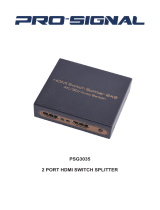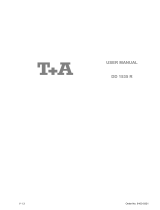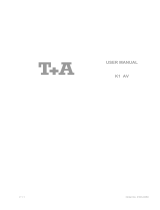
11
CXR120/200
ENGLISH
Note: Dolby Digital and DTS formats can sometimes carry less channels
than their maximum such as Dolby Digital (2/0) which means a Dolby Digital
encoded signal which is actually only carrying a two channel stereo signal
(other channels inactive).
Known also as DTS (3/2) or DTS 5.1, DTS provides (up to) 5.1 output from
suitable encoded DTS material, with 5 main channels (Front Left, Front Right,
Centre, Surround Left, Surround Right) and a Low Frequency Eects Channel
for the subwoofer, all discretely encoded. Decoding DTS requires a suitably
encoded DTS disc and a digital connection from the source equipment to
the CXR.
Known also as Dolby Digital (3/3) or Dolby Digital 6.1, an enhanced form of
Dolby Digital. On top of the discretely encoded 5.1 channels Dolby Digital EX
provides an extra 6th channel (Surround Back, giving 6.1) matrix encoded into
the rear surrounds for greater image depth and more solid sound localisation
behind the listener. Dolby Digital EX requires a Dolby Digital EX encoded disc.
Dolby Digital EX is backwards compatible with Dolby Digital 5.1 decoding. If
Dolby Digital EX is decoded as normal Dolby Digital the Surround Back signal
will be present in both Left and Right Rear Surrounds (forming a phantom rear
centre). It can also be decoded as 7.1 by sending the Surround Back decode
to both the Surround Back Left and Right speakers (forming two mono Back
Surrounds).
Known also as DTS (3/3) Matrix, an enhanced form of DTS. On top of the
discretely encoded 5.1 channels DTS ES also provides an extra 6th channel
(Surround Back giving 6.1), matrix encoded into the rear surrounds for greater
image depth and more solid sound localisation behind the listener. DTS ES
requires a DTS ES encoded disc. DTS ES material is backwards compatible
with DTS 5.1 decoding. If DTS ES is decoded as normal DTS the Surround
Back signal will be present in both Left and Right Rear Surrounds (forming a
phantom rear centre). It can also be decoded as 7.1 by sending the Surround
Back decode to the both the Surround Back Left and Right speakers (forming
two mono Back Surrounds).
Another enhanced form of DTS, also known as DTS (3/3) Discrete or DTS
ES Discrete 6.1. DTS ES Discrete also provides an extra channel (Surround
Back) for greater image depth and more solid sound localisation behind the
listener, however in this case extra data is included in the bitstream so that all
channels are discretely encoded. The Surround Back has greater separation
from the other channels than is possible with matrix encoded technologies.
DTS-ES Discrete requires a DTS-ES Discrete encoded disc.
DTS ES Discrete is backwards compatible with both DTS 5.1 and DTS
ES Matrix 6.1 decoding. If DTS ES Discrete is decoded as normal DTS the
Surround Back signal will be present in both Left and Right Rear Surrounds
(forming a phantom rear centre). If DTS ES Discrete is decoded with DTS ES
Matrix the Surround Back signal will be decoded separately (i.e. as 6.1) but by
a matrix process, which will give the same channel separation as if the source
disc were actually DTS ES Matrix (but not as good as DTS EX Discrete).
It can also be decoded as 7.1 by sending the Surround Back decode to
both the Surround Back Left and Right speakers (forming two mono Back
Surrounds).
The replacement for the original Dolby Pro Logic, Dolby Pro Logic II is a
technology where 5 channels (Front Left, Front Right, Centre, Surround
Left, Surround Right) are encoded into a Stereo mix by an analogue matrix
process. Dolby Pro Logic II material can be played back by normal Stereo
equipment (as Stereo) or decoded into 5 channel surround-sound.
Dolby Pro Logic II is compatible with the earlier 4 channel (Left, Centre,
Right and mono Surround) Dolby Pro Logic system (which was the decoding
counterpart to Dolby Surround encoding) as used widely on Video tapes, TV
broadcasts and earlier lms.
Note: Dolby Pro Logic does not include a Low Frequency Eects channel for
the Subwoofer, but the CXR can create a Subwoofer output (for 5.1) via Bass
management. Refer to the 'Speaker Setup' section of this manual.
A newer version of Dolby Pro Logic II which is able to recreate 7 discrete
surround sound channels from suitable encoded stereo source material.
Dolby Pro Logic IIx also has modes for post processing either Stereo material
or 5.1 material into 7 channels whether or not it has been Dolby Pro Logic
IIx encoded. When 5.1 decoding is required, Dolby Pro Logic II decoding will
always be used by the CXR in place of Dolby Pro Logic IIx as IIx only works
for 7 channel output.
Note: Dolby Pro Logic IIx does not include a Low Frequency Eects channel
for the Subwoofer, but the CXR can create a Subwoofer output (for 7.1) via
Bass management. Refer to the 'Speaker Setup' section of this manual.
A new Dolby matrix technology that delivers additional height channels
positioned above the front left and right speakers. Dolby Pro Logic IIz
identies spatial cues that occur naturally in most content plus ambient sound
and amorphous eects such as rain or wind and directs them to additional
front height speakers.
Movie and game producers can also mix specic additional height channels
into a 2ch, 5.1 or 7.1 soundtrack, which Dolby Pro Logic IIz will then decode
as a post process.
If it is desired to use Dolby Pro Logic IIz, you should set the CXR to 5.1
+ Height mode, connect two speakers to the SBL and SBR outputs and
physically position them above your left and right front speakers, then select
Dolby Pro Logic IIz post processing. See later section.
A DTS technology which is able to recreate 6 channel (Left Front, Right Front,
Centre, Left Surround, Right Surround, Surround Back ) surround sound from
suitable analogue matrix encoded stereo source material. DTS Neo:6 material
can be played back by normal Stereo equipment (as Stereo) or decoded into
7.1 by sending the Surround Back decode to the both the Surround Back Left
and Right speakers (forming two mono Back Surrounds).
Note: Neo:6 does not include a Low Frequency Eects channel for
the Subwoofer, but the CXR can create a Subwoofer output via Bass
management. Refer to the 'Speaker Setup' section of this manual.
A DTS technology that provides 5.1 channels of 96kHz / 24bit audio (along
with video if required) on DVD-Video and DVD-Audio (video zone) discs (when
suitably encoded in DTS 96/24). DVD players which allow 'DTS digital out'
pass the DTS 96/24 bitstream over S/P DIF or HDMI for decoding in the CXR.
DSP modes
Stereo/Stereo + Sub
These modes allow you to choose between conventional stereo left and right
speakers or stereo speakers with subwoofer.
Direct
Analogue and digital inputs will bypass any DSP, Bass/Treble controls and
multichannel post processing.
All channels
A stereo input will be mapped to all speakers, with left speakers receiving left
stereo and right speakers receiving right stereo. The center and sub will be
sent a mono signal.



















